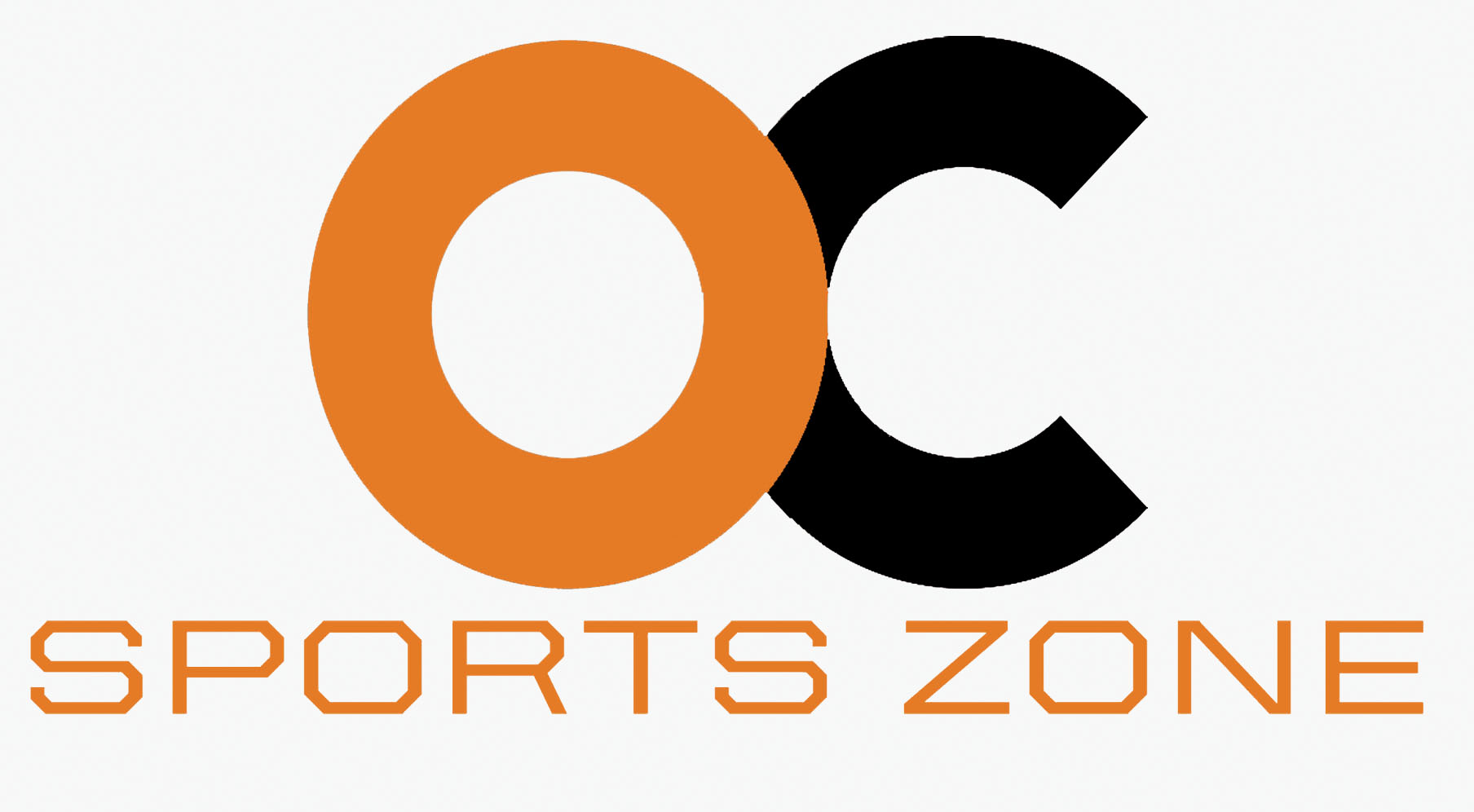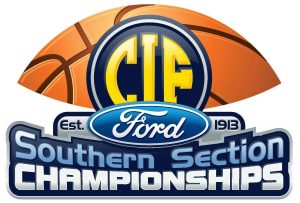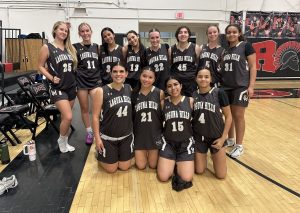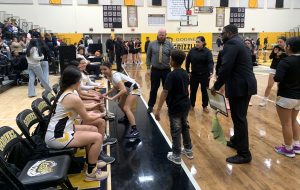CIF Commissioner Rob Wigod is still hopeful high school sports can return in 2021. (File photo courtesy CIF Southern Section)
CIF Southern Section Commissioner Rob Wigod said Wednesday he understands the frustration that high school athletes, coaches, parents and fans have around Southern California as they continue to wait for a decision on sports.
But he insisted in an interview with OC Sports Zone ‘this is not the time to give up.”
Wigod was reacting to the announcement on Wednesday by the CIF state office that all sports are being put on hold as officials wait for further guidance from the California Department of Health.
CIF state officials said they don’t expect any guidance until at least Jan. 1, 2021 and Wigod said he is planning an update for the CIF Southern Section on Jan. 19.
Wigod hasn’t been able do attend CIF championship events since March. The coronavirus pandemic struck in March and high school sports have been on hold ever since.
He’s still hoping that CIF sports will return in 2021.
“When you’re only in the office or you’re confined to working at home and you’re not getting the opportunities to be at the different championships and be out at the different contests and watch student athletes do what they do, that’s had a big impact on me personally, because that’s the most enjoyable part of this job,” Wigod said. “And we haven’t had the opportunity to do that since mid-March, so I totally look forward to being able to do that.”
The CIF’s revised plan which had some sports starting in December and football starting in January 2021, has been put on hold, CIF State offcials announced on Tuesday. But both state and Southern Section officials are still holding out hope that sports can start in January or February of 2021.
However, with most counties now in the most restrictive purple tier and coronavirus cases surging throughout the state and the country, many challenges are ahead.
Here are excerpts of Wigod’s interview with OC Sports Zone:
Bring us up to date on where we are for the first season?
Wigod: Based on the circumstances obviously state-wide, it was pretty clear that with virtually every state in the purple category that the guidelines that were released in August are still applying today and limit any kind of competition that might take place and even full practices. It’s pretty evident now and we need to focus on what the next possibilities would be.
What do you think the chances are the fall seasons can be played and can the schedules be adjusted?
Wigod: They can be and I think one of the reasons the state office did make that announcement yesterday was to give the sections maximum flexibility going forward. As you know, when we build our schedules, we build them from the back and work forward. So the state picks dates for their state regionals and state championship dates, and we then identify section championship dates that have to be in advance of the state and then leagues have to be informed when their league play needs to be done.
When the state takes the back end off the table, now that does give us maximum flexibility to make adjustments if we need to make them for a later start or even extensions of our regular seasons.
If the first season is cancelled, what are the chances of season two sports being played?
Wigod: Well again, we want to go as real scenarios come forward and deal with the actual scenarios at that time. We certainly would want to keep fall sports as long as we possibly can and if that comes to a point where that isn’t possible, obviously we would pivot to spring sports and really hope we can get those started on time and allow those to go forward in the calendar that we’ve published.
Is there a projected date for football now?
Wigod: (Wigod will provide an update on Jan. 19 on Southern Section Championships). The thought process there was these next four to six weeks are going to be extremely critical to see what kind of movement happens or any progress made so that needs to visited at the end of this next four to six weeks to see where we actually are and how that impacts what we would be do going forward with regular season and post-season. We will use the time available until that time to keep working on the different ideas and different scenarious that are possible.
What is your reaction to the rising coronavirus cases in Los Angeles and Orange Counties?
Wigod: I’ve been tracking them every week and they are staggering numbers in many respects of what they were a month ago and I think we all know that. We’ve seen the tremendous surge that’s happened here in the month of November and now leading into early December. What I saw yesterday was Orange County had been for a long time one of the counties that was in red (tier) and maybe even moving toward the orange tier. Orange County, now based on what I saw yesterday, was I think the second highest number of cases per 100,000.
It’s obviously a reality we have to deal with right now and until this does improve and start to move forward, it’s going to be very difficult for health authorities and government officials and schools and school districts even private school leadership to start thinking about how to bring more students back to campus and more activities back to campus in this kind of scenario.
We’re sure you’ve heard the complaints of athletes; they’re frustrated. They see high school football going on in other states and college football being played and they wonder why they can’t play football now?
Wigod: We’re frustrated too; we want the same thing they want. We want the return of high school athletics. But we’ve always been consistent in the message that the individual schools, school districts and private schools make these decisions. I know a lot of people believe it is the CIF that is preventing the start of high school sports and I think that’s a very big misunderstanding that people have.
We’ve provided the structure, the framework, a calendar and we’ve tried our best to show how this could possibly happen. But we’re not the ones who are not letting it happen. What’s not happening is, again due to this health pandemic, our health authorities at the state and local levels are providing guidance and saying that these activities are not to be allowed and our individual schools, school districts and private schools are making decisions not to have students on campus and not to have athletic teams because they are following these guidelines.
So what may be happening in other states or even club and travel organizations that are continuing to function sort of outside of that environment, I see the frustration. My daughter is in Florida and has a game-day job with the Tampa Bay Buccaneers and she works on game days and she works in the stadium and there are fans there and she’s interacting with fans and you see them on TV watching the NFL play.
Here in California, we’re far away from that. So you ask yourself what’s so different? Why are they doing what we are not doing? I’m not sure I’m the one to answer it but I do know we want the same thing that our student athletes want and what our coaches want and principals and parents want, our officials, our media members. Everybody we call stakeholders wants the same thing but to return high school athletics to what we’re used to and what we love, it has to be done in a healthy and safe way.
….. I have to be honest in saying that those who really know, understand it is not the CIF. If anything, we are the ones who want students to play every bit as much as they do and we’ve provided a way for that to happen in the 2020-21 school year. But until this pandemic is moving in the right direction and our health authorites believe it’s healthy and safe to do it, and then our schoools, school districts and private schools think it’s healthy and safe to do it, it’s not going to happen.
Some coaches have suggested football be moved to March. Thoughts on that?
Wigod: We’ve had some discussions about that but our Sports Medicine Advisory Committee which is made up of doctors and health professionals from around the state has really said that what has been proposed and the length of season and when it should end is really about the limit to when you could extend it. The idea of continuing to play football in April or May and into June and then you are arguably able to start the next season on time, now you have a very small window between the end of the current season and the start of a new one.
We have an ambitious list of spring sports already on tap, so if you start encroaching into that by extending fall sports even further you really create a lot of problems for student athletes, for facilities, for coaches, for almost everybody up and down the spectrum of what we do.
We’re going to try our best to fit within the windows that we’ve got.
What is your reaction to the state ending the regional and state playoffs for sports in season one?
Wigod: I want to support Executive Director Ron Nocetti and the CIF state office because I think their real priority was, ‘what can we do to help maximize our sections’ ability to provide opportunities for student athletes.’ So they realized that their events being on the calendar do take away some flexibility that we would have. So at least for the fall, by taking those off the table, they are giving all the sections a chance to keep looking at potential scenarios, understanding the fact that we just aren’t going to be able to start as we originally planned in mid-December.
So it appears to give you some additional flexibilty in terms of football with an additional two weeks?
Wigod: Correct, and it also allows an even later start of football, into January, mid-January, even potentially later than that because if we are able to do that and we see some progress made, we can take the section championship weeks that are planned, we can take the state regional championship week that was planned, that’s a total of five weeks and at some point, those could be applied to the regular season instead of being locked into post-season dates where the season had to end on March 12. The season may continue to March 19, March 26 or April 2.
There is a scenario that potentially could happen. It could still result in having a five, six or seven game football season …. We just have to keep all options on the table for post-season play, for regular season play, anything that we can possibly do to support student athletes has been our focus since the middle of March when the pandemic hit us initially.
Talk about your dealings with the California Department of Public Health?
Wigod: There have been very frequent meetings through the months of October and early November and I think we were getting very close to getting some guidelines from them in response to the plan we submitted. Unfortunately, that response kept being delayed to the point where really it came to a head on Nov. 16 where that morning we expected to get the guidelines and then we were contacted and told the governor was going to speak at noon. And when the governor spoke at noon on Nov. 16 that was a whole different situation when virtually every county in the state was moved to purple tier and the numbers have continued in that way since Nov. 16 to where we had a different situation.
And now that we do, I think the California Department of Public Health is focused on such a bigger picture however we’re still hopeful we’re going to get those guidelines and we’re going to get the information from them when they’re ready. We just don’t know that it’s going to be as forthcoming as we thought it would be as recently as a little over a couple weeks ago.
Talk about the financial impact of the pandemic to the CIF Southern Section with current losses well over $200,000:
Wigod: Projections could be much larger than that. We’ve tried our best to educate everyone, our membership and anyone else about our structure, which is leveraged very highly on sports championships and attendance and revenue we get from our section championships. That’s somewhere in the neighborhood of 50 percent of our revenues each year and without the ability to have championships: first if we don’t have them or secondly if we have them but we don’t have spectators and that has a huge impact on us. And there are ancillary revenues that come with it, there’s television and webcast broadcast fees and the sale of championship apparel, there is sponsorship and corporate partners that contribute to our organization, which keeps membership dues lower.
But I’ve also been clear about the fact that whether we can have spectators or not, we are going to play if we can play. We’re not going to let the financial picture keep student athletes from competing and having the opportunity to play out there. But we have to be honest to our membership that they are real and the consequences of this pandemic in March, with no championship revenue from the spring, we found a way to weather through that one, but so far this school year, we have run out of revenue streams to pursue in most cases without sports championships.
We have tried to make every sacrifice we can make. We only have two things we can do. You can either have revenue or you can have expenses and if you aren’t getting revenue, you have to cut expenses. And our single largest expense, as in any company, is your staffing, and all of us, administrators, sports staff, everyone is going to be affected by the circumstances that we’re in.
Are you concerned that some districts may opt out for sports for 2020-21?
Wigod: I have to have the faith and confidence in our leadership at our schools to do what they think is in their best interests. So I will always respect their decisions and if there comes a point where a school district, or a private school or an individual school determines they just don’t believe it’s safe or healthy for their students to participate I’m going to respect that. We will have to cross that bridge again when it comes or as people begin to look into decisions like that.
Any recommendations to keep athletes safe during this time?
Wigod: I just hope they can continue to do what they have been doing. I know there have been the conditioning workouts and the ability to get together at least in that format …. .It’s still not the time to give up and I have been kind of centered on a little phrase I used to hear years ago. It came from Jesse Jackson where he always talked about ‘keep hope alive.’ It’s not anything I came up with, but I think we have to keep hope alive for our student athletes and everyone involved and until we cannot do that, we need to do that. We still believe there is a chance this can happen and we still want to work on any and every way possible to do that ….. This isn’t the time to give up and I hope they won’t but I can understand if they’re discouraged, there’s no question about that.
You have concerns about parents choosing to have their children play club sports instead of CIF?
Wigod: I understand what the feeling is and I understand the desire to be able to participate and if the club and travel organizations are operating while the schools are not there is certainly a different dynamic at work here. They’re still in the same counties and still under the same health orders schools are under. But they don’t necessarily have the same district leadership or school leadership or other people they answer to and certainly students and parents are interested in having outlets for their students to participate in. We very early in this process decided that rule 600 would not apply, students could do school and club at the same time in terms of playing in contests which we had never done before.
And if people believe there is not a high school alternative and this is the only alternative for them, I’m not one to tell them they can’t do that. I still believe high school and education based athletics is a unique and special opportunity. We’re the only ones that do it and I think it’s something really important to the growth and development of young people and I would hope we will always be there and be able to offer that to them and we’re still in the position that we can, so I want to focus more on that.
Thoughts on having coronavirus testing as a requirement for athletes to compete:
Wigod: It’s not something that our organization would be involved in. These are minors, these are students who are under control of their school administration and the supervision and authority of their school administration. Those are school decisions and if they in their decision making process in opening back up and allowing academics to resume full-time on campus with all their student bodies, then obviously the athletic programs as well, it’s really going to be something that’s going to come from the local level because it’s just not the role we play in terms of supervising students.
Thoughts on the expected approval of two coronavirus vaccines?
Wigod: It’s absolutely hoped that is something that makes a big difference. What’s been disheartening for me is to see the measures that people keep being asked to do, the washing of your hands and wearing a mask and social distancing and avoiding the crowds clearly aren’t happening because of the numbers and the surges and the things we are experiencing.
So if the vaccine can help restore the confidence that people have in being able to go out and about and being able to make an impact on these numbers and reduce the cases and reduce the transmission, it’s absolutely hoped that could be a way that helps us start to move in the other direction. We’re probably worse off than we were in July, then what’s going to change that pattern? Maybe the vaccine can help with people maybe finally realizing how dire the situation is becoming that we really start to try to take back control of this thing.
You’re a parent; what is the message to parents who want the best for their children?
Wigod: I think parents are frustrated; they’re frustrated with the idea that the age group they’re involved in and all the numbers and statistics have been saying that the age group of high school student athletes is not a huge area for this virus to take root. But it’s bigger than that. It’s not just the student athletes; it’s who they are in contact with, who they come in contact with. We all understand now how this virus works and how it is transmitted.
They’re living with student athletes every day who are missing out on something that is very special to them. And parents enjoy it too. They enjoy being a part of it with their student athletes. So the frustration levels and based on communications we get every day from parents wanting their kids to play, and we want their kids to play too.
It’s an incredibly difficult time for everybody involved. While we talk about high school athletics, there are still people who are sick, there are people who are in hospitals and people who are in intensive care units and there are people who are dying every day. Sometimes it’s a little bit hard to hear that this group is more immune from it than this group and all the rest of that. I can understand that, and there are maybe statistics that back it up, but I still think that we lose sight of what we are going through and what we are experiencing, and everyone is.
Everyone knows somebody who has gotten this virus, plenty of people know people they’ve lost because of it so I always want us to keep in mind there are bigger factors and bigger things happening too. I don’t think we should be dismissive of what this is actually doing to our nation and to our communities.
What can we all do to help for sports to return?
Wigod: I think we just continue to try and remain as positive as we can and try to look for a time when we are able to try and get things to return. There are things that we can do to help as individuals and as groups and we can just hope for this to actually start to move in the other direction like we’ve been hoping for. If people would have told us back in March that on Dec. 2 we would still be talking about this and it would actually be worse than it was by a long-shot than it was in mid-March when it hit us, I think we would be completely staggered by that knowledge.
But we are, and that’s the reality. We’ve got to start making things happen and they need to happen fairly quickly if we are going to see the return of high school education in terms of academics on campus and then also athletics. That’s got to start happening and it has to start happening soon to be where we really want to be.
-Tim Burt, OC Sports Zone; timburt@ocsportszone.com






More Stories
Laguna Hills girls basketball team aiming to bring home another CIF championship
Orange girls basketball team reaches CIF finals for first time in school history
Laguna Hills boys basketball team makes history with road win in CIF Division 6 semifinals